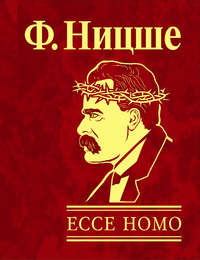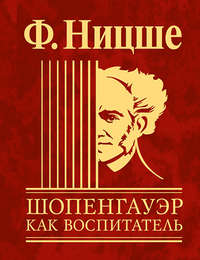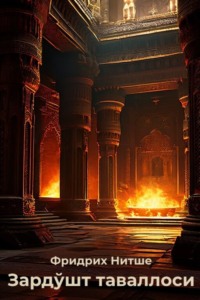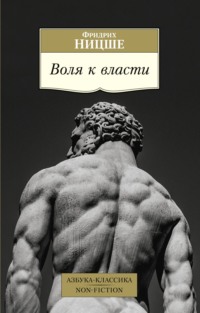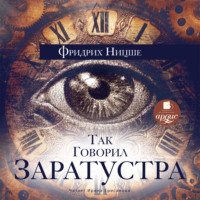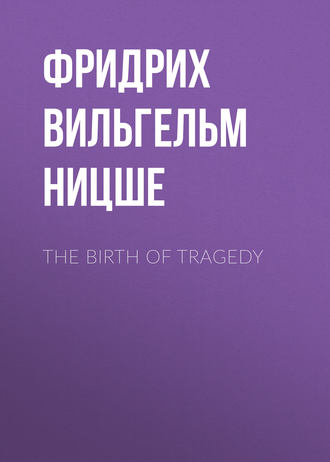 полная версия
полная версияThe Birth of Tragedy
But now science, spurred on by its powerful illusion, hastens irresistibly to its limits, on which its optimism, hidden in the essence of logic, is wrecked. For the periphery of the circle of science has an infinite number of points, and while there is still no telling how this circle can ever be completely measured, yet the noble and gifted man, even before the middle of his career, inevitably comes into contact with those extreme points of the periphery where he stares at the inexplicable. When he here sees to his dismay how logic coils round itself at these limits and finally bites its own tail – then the new form of perception discloses itself, namely tragic perception, which, in order even to be endured, requires art as a safeguard and remedy.
If, with eyes strengthened and refreshed at the sight of the Greeks, we look upon the highest spheres of the world that surrounds us, we behold the avidity of the insatiate optimistic knowledge, of which Socrates is the typical representative, transformed into tragic resignation and the need of art: while, to be sure, this same avidity, in its lower stages, has to exhibit itself as antagonistic to art, and must especially have an inward detestation of Dionyso-tragic art, as was exemplified in the opposition of Socratism to Æschylean tragedy.
Here then with agitated spirit we knock at the gates of the present and the future: will that "transforming" lead to ever new configurations of genius, and especially of the music-practising Socrates? Will the net of art which is spread over existence, whether under the name of religion or of science, be knit always more closely and delicately, or is it destined to be torn to shreds under the restlessly barbaric activity and whirl which is called "the present day"? – Anxious, yet not disconsolate, we stand aloof for a little while, as the spectators who are permitted to be witnesses of these tremendous struggles and transitions. Alas! It is the charm of these struggles that he who beholds them must also fight them!
16By this elaborate historical example we have endeavoured to make it clear that tragedy perishes as surely by evanescence of the spirit of music as it can be born only out of this spirit. In order to qualify the singularity of this assertion, and, on the other hand, to disclose the source of this insight of ours, we must now confront with clear vision the analogous phenomena of the present time; we must enter into the midst of these struggles, which, as I said just now, are being carried on in the highest spheres of our present world between the insatiate optimistic perception and the tragic need of art. In so doing I shall leave out of consideration all other antagonistic tendencies which at all times oppose art, especially tragedy, and which at present again extend their sway triumphantly, to such an extent that of the theatrical arts only the farce and the ballet, for example, put forth their blossoms, which perhaps not every one cares to smell, in tolerably rich luxuriance. I will speak only of the Most Illustrious Opposition to the tragic conception of things – and by this I mean essentially optimistic science, with its ancestor Socrates at the head of it. Presently also the forces will be designated which seem to me to guarantee a re-birth of tragedy – and who knows what other blessed hopes for the German genius!
Before we plunge into the midst of these struggles, let us array ourselves in the armour of our hitherto acquired knowledge. In contrast to all those who are intent on deriving the arts from one exclusive principle, as the necessary vital source of every work of art, I keep my eyes fixed on the two artistic deities of the Greeks, Apollo and Dionysus, and recognise in them the living and conspicuous representatives of two worlds of art which differ in their intrinsic essence and in their highest aims. Apollo stands before me as the transfiguring genius of the principium individuationis through which alone the redemption in appearance is to be truly attained, while by the mystical cheer of Dionysus the spell of individuation is broken, and the way lies open to the Mothers of Being,[20] to the innermost heart of things. This extraordinary antithesis, which opens up yawningly between plastic art as the Apollonian and music as the Dionysian art, has become manifest to only one of the great thinkers, to such an extent that, even without this key to the symbolism of the Hellenic divinities, he allowed to music a different character and origin in advance of all the other arts, because, unlike them, it is not a copy of the phenomenon, but a direct copy of the will itself, and therefore represents the metaphysical of everything physical in the world, the thing-in-itself of every phenomenon. (Schopenhauer, Welt als Wille und Vorstellung, I. 310.) To this most important perception of æsthetics (with which, taken in a serious sense, æsthetics properly commences), Richard Wagner, by way of confirmation of its eternal truth, affixed his seal, when he asserted in his Beethoven that music must be judged according to æsthetic principles quite different from those which apply to the plastic arts, and not, in general, according to the category of beauty: although an erroneous æsthetics, inspired by a misled and degenerate art, has by virtue of the concept of beauty prevailing in the plastic domain accustomed itself to demand of music an effect analogous to that of the works of plastic art, namely the suscitating delight in beautiful forms. Upon perceiving this extraordinary antithesis, I felt a strong inducement to approach the essence of Greek tragedy, and, by means of it, the profoundest revelation of Hellenic genius: for I at last thought myself to be in possession of a charm to enable me – far beyond the phraseology of our usual æsthetics – to represent vividly to my mind the primitive problem of tragedy: whereby such an astounding insight into the Hellenic character was afforded me that it necessarily seemed as if our proudly comporting classico-Hellenic science had thus far contrived to subsist almost exclusively on phantasmagoria and externalities.
Perhaps we may lead up to this primitive problem with the question: what æsthetic effect results when the intrinsically separate art-powers, the Apollonian and the Dionysian, enter into concurrent actions? Or, in briefer form: how is music related to image and concept? – Schopenhauer, whom Richard Wagner, with especial reference to this point, accredits with an unsurpassable clearness and perspicuity of exposition, expresses himself most copiously on the subject in the following passage which I shall cite here at full length22 (Welt als Wille und Vorstellung, I. p. 309): "According to all this, we may regard the phenomenal world, or nature, and music as two different expressions of the same thing,23 which is therefore itself the only medium of the analogy between these two expressions, so that a knowledge of this medium is required in order to understand that analogy. Music, therefore, if regarded as an expression of the world, is in the highest degree a universal language, which is related indeed to the universality of concepts, much as these are related to the particular things. Its universality, however, is by no means the empty universality of abstraction, but of quite a different kind, and is united with thorough and distinct definiteness. In this respect it resembles geometrical figures and numbers, which are the universal forms of all possible objiects of experience and applicable to them all a priori, and yet are not abstract but perceptiple and thoroughly determinate. All possible efforts, excitements and manifestations of will, all that goes on in the heart of man and that reason includes in the wide, negative concept of feeling, may be expressed by the infinite number of possible melodies, but always in the universality of mere form, without the material, always according to the thing-in-itself, not the phenomenon, – of which they reproduce the very soul and essence as it were, without the body. This deep relation which music bears to the true nature of all things also explains the fact that suitable music played to any scene, action, event, or surrounding seems to disclose to us its most secret meaning, and appears as the most accurate and distinct commentary upon it; as also the fact that whoever gives himself up entirely to the impression of a symphony seems to see all the possible events of life and the world take place in himself: nevertheless upon reflection he can find no likeness between the music and the things that passed before his mind. For, as we have said, music is distinguished from all the other arts by the fact that it is not a copy of the phenomenon, or, more accurately, the adequate objectivity of the will, but the direct copy of the will itself, and therefore represents the metaphysical of everything physical in the world, and the thing-in-itself of every phenomenon. We might, therefore, just as well call the world embodied music as embodied will: and this is the reason why music makes every picture, and indeed every scene of real life and of the world, at once appear with higher significance; all the more so, to be sure, in proportion as its melody is analogous to the inner spirit of the given phenomenon. It rests upon this that we are able to set a poem to music as a song, or a perceptible representation as a pantomime, or both as an opera. Such particular pictures of human life, set to the universal language of music, are never bound to it or correspond to it with stringent necessity, but stand to it only in the relation of an example chosen at will to a general concept. In the determinateness of the real they represent that which music expresses in the universality of mere form. For melodies are to a certain extent, like general concepts, an abstraction from the actual. This actual world, then, the world of particular things, affords the object of perception, the special and the individual, the particular case, both to the universality of concepts and to the universality of the melodies. But these two universalities are in a certain respect opposed to each other; for the concepts contain only the forms, which are first of all abstracted from perception, – the separated outward shell of things, as it were, – and hence they are, in the strictest sense of the term, abstracta; music, on the other hand, gives the inmost kernel which precedes all forms, or the heart of things. This relation may be very well expressed in the language of the schoolmen, by saying: the concepts are the universalia post rem, but music gives the universalia ante rem, and the real world the universalia in re. – But that in general a relation is possible between a composition and a perceptible representation rests, as we have said, upon the fact that both are simply different expressions of the same inner being of the world. When now, in the particular case, such a relation is actually given, that is to say, when the composer has been able to express in the universal language of music the emotions of will which constitute the heart of an event, then the melody of the song, the music of the opera, is expressive. But the analogy discovered by the composer between the two must have proceeded from the direct knowledge of the nature of the world unknown to his reason, and must not be an imitation produced with conscious intention by means of conceptions; otherwise the music does not express the inner nature of the will itself, but merely gives an inadequate imitation of its phenomenon: all specially imitative music does this."
We have therefore, according to the doctrine of Schopenhauer, an immediate understanding of music as the language of the will, and feel our imagination stimulated to give form to this invisible and yet so actively stirred spirit-world which speaks to us, and prompted to embody it in an analogous example. On the other hand, image and concept, under the influence of a truly conformable music, acquire a higher significance. Dionysian art therefore is wont to exercise – two kinds of influences, on the Apollonian art-faculty: music firstly incites to the symbolic intuition of Dionysian universality, and, secondly, it causes the symbolic image to stand forth in its fullest significance. From these facts, intelligible in themselves and not inaccessible to profounder observation, I infer the capacity of music to give birth to myth, that is to say, the most significant exemplar, and precisely tragic myth: the myth which speaks of Dionysian knowledge in symbols. In the phenomenon of the lyrist, I have set forth that in him music strives to express itself with regard to its nature in Apollonian images. If now we reflect that music in its highest potency must seek to attain also to its highest symbolisation, we must deem it possible that it also knows how to find the symbolic expression of its inherent Dionysian wisdom; and where shall we have to seek for this expression if not in tragedy and, in general, in the conception of the tragic?
From the nature of art, as it is ordinarily conceived according to the single category of appearance and beauty, the tragic cannot be honestly deduced at all; it is only through the spirit of music that we understand the joy in the annihilation of the individual. For in the particular examples of such annihilation only is the eternal phenomenon of Dionysian art made clear to us, which gives expression to the will in its omnipotence, as it were, behind the principium individuationis, the eternal life beyond all phenomena, and in spite of all annihilation. The metaphysical delight in the tragic is a translation of the instinctively unconscious Dionysian wisdom into the language of the scene: the hero, the highest manifestation of the will, is disavowed for our pleasure, because he is only phenomenon, and because the eternal life of the will is not affected by his annihilation. "We believe in eternal life," tragedy exclaims; while music is the proximate idea of this life. Plastic art has an altogether different object: here Apollo vanquishes the suffering of the individual by the radiant glorification of the eternity of the phenomenon; here beauty triumphs over the suffering inherent in life; pain is in a manner surreptitiously obliterated from the features of nature. In Dionysian art and its tragic symbolism the same nature speaks to us with its true undissembled voice: "Be as I am! Amidst the ceaseless change of phenomena the eternally creative primordial mother, eternally impelling to existence, self-satisfying eternally with this change of phenomena!"
17Dionysian art, too, seeks to convince us of the eternal joy of existence: only we are to seek this joy not in phenomena, but behind phenomena. We are to perceive how all that comes into being must be ready for a sorrowful end; we are compelled to look into the terrors of individual existence – yet we are not to become torpid: a metaphysical comfort tears us momentarily from the bustle of the transforming figures. We are really for brief moments Primordial Being itself, and feel its indomitable desire for being and joy in existence; the struggle, the pain, the destruction of phenomena, now appear to us as something necessary, considering the surplus of innumerable forms of existence which throng and push one another into life, considering the exuberant fertility of the universal will. We are pierced by the maddening sting of these pains at the very moment when we have become, as it were, one with the immeasurable primordial joy in existence, and when we anticipate, in Dionysian ecstasy, the indestructibility and eternity of this joy. In spite of fear and pity, we are the happy living beings, not as individuals, but as the one living being, with whose procreative joy we are blended.
The history of the rise of Greek tragedy now tells us with luminous precision that the tragic art of the Greeks was really born of the spirit of music: with which conception we believe we have done justice for the first time to the original and most astonishing significance of the chorus. At the same time, however, we must admit that the import of tragic myth as set forth above never became transparent with sufficient lucidity to the Greek poets, let alone the Greek philosophers; their heroes speak, as it were, more superficially than they act; the myth does not at all find its adequate objectification in the spoken word. The structure of the scenes and the conspicuous images reveal a deeper wisdom than the poet himself can put into words and concepts: the same being also observed in Shakespeare, whose Hamlet, for instance, in an analogous manner talks more superficially than he acts, so that the previously mentioned lesson of Hamlet is to be gathered not from his words, but from a more profound contemplation and survey of the whole. With respect to Greek tragedy, which of course presents itself to us only as word-drama, I have even intimated that the incongruence between myth and expression might easily tempt us to regard it as shallower and less significant than it really is, and accordingly to postulate for it a more superficial effect than it must have had according to the testimony of the ancients: for how easily one forgets that what the word-poet did not succeed in doing, namely realising the highest spiritualisation and ideality of myth, he might succeed in doing every moment as creative musician! We require, to be sure, almost by philological method to reconstruct for ourselves the ascendency of musical influence in order to receive something of the incomparable comfort which must be characteristic of true tragedy. Even this musical ascendency, however, would only have been felt by us as such had we been Greeks: while in the entire development of Greek music – as compared with the infinitely richer music known and familiar to us – we imagine we hear only the youthful song of the musical genius intoned with a feeling of diffidence. The Greeks are, as the Egyptian priests say, eternal children, and in tragic art also they are only children who do not know what a sublime play-thing has originated under their hands and – is being demolished.
That striving of the spirit of music for symbolic and mythical manifestation, which increases from the beginnings of lyric poetry to Attic tragedy, breaks off all of a sudden immediately after attaining luxuriant development, and disappears, as it were, from the surface of Hellenic art: while the Dionysian view of things born of this striving lives on in Mysteries and, in its strangest metamorphoses and debasements, does not cease to attract earnest natures. Will it not one day rise again as art out of its mystic depth?
Here the question occupies us, whether the power by the counteracting influence of which tragedy perished, has for all time strength enough to prevent the artistic reawaking of tragedy and of the tragic view of things. If ancient tragedy was driven from its course by the dialectical desire for knowledge and the optimism of science, it might be inferred that there is an eternal conflict between the theoretic and the tragic view of things, and only after the spirit of science has been led to its boundaries, and its claim to universal validity has been destroyed by the evidence of these boundaries, can we hope for a re-birth of tragedy: for which form of culture we should have to use the symbol of the music-practising Socrates in the sense spoken of above. In this contrast, I understand by the spirit of science the belief which first came to light in the person of Socrates, – the belief in the fathomableness of nature and in knowledge as a panacea.
He who recalls the immediate consequences of this restlessly onward-pressing spirit of science will realise at once that myth was annihilated by it, and that, in consequence of this annihilation, poetry was driven as a homeless being from her natural ideal soil. If we have rightly assigned to music the capacity to reproduce myth from itself, we may in turn expect to find the spirit of science on the path where it inimically opposes this mythopoeic power of music. This takes place in the development of the New Attic Dithyramb, the music of which no longer expressed the inner essence, the will itself, but only rendered the phenomenon insufficiently, in an imitation by means of concepts; from which intrinsically degenerate music the truly musical natures turned away with the same repugnance that they felt for the art-destroying tendency of Socrates. The unerring instinct of Aristophanes surely did the proper thing when it comprised Socrates himself, the tragedy of Euripides, and the music of the new Dithyrambic poets in the same feeling of hatred, and perceived in all three phenomena the symptoms of a degenerate culture. By this New Dithyramb, music has in an outrageous manner been made the imitative portrait of phenomena, for instance, of a battle or a storm at sea, and has thus, of course, been entirely deprived of its mythopoeic power. For if it endeavours to excite our delight only by compelling us to seek external analogies between a vital or natural process and certain rhythmical figures and characteristic sounds of music; if our understanding is expected to satisfy itself with the perception of these analogies, we are reduced to a frame of mind in which the reception of the mythical is impossible; for the myth as a unique exemplar of generality and truth towering into the infinite, desires to be conspicuously perceived. The truly Dionysean music presents itself to us as such a general mirror of the universal will: the conspicuous event which is refracted in this mirror expands at once for our consciousness to the copy of an eternal truth. Conversely, such a conspicious event is at once divested of every mythical character by the tone-painting of the New Dithyramb; music has here become a wretched copy of the phenomenon, and therefore infinitely poorer than the phenomenon itself: through which poverty it still further reduces even the phenomenon for our consciousness, so that now, for instance, a musically imitated battle of this sort exhausts itself in marches, signal-sounds, etc., and our imagination is arrested precisely by these superficialities. Tone-painting is therefore in every respect the counterpart of true music with its mythopoeic power: through it the phenomenon, poor in itself, is made still poorer, while through an isolated Dionysian music the phenomenon is evolved and expanded into a picture of the world. It was an immense triumph of the non-Dionysian spirit, when, in the development of the New Dithyramb, it had estranged music from itself and reduced it to be the slave of phenomena. Euripides, who, albeit in a higher sense, must be designated as a thoroughly unmusical nature, is for this very reason a passionate adherent of the New Dithyrambic Music, and with the liberality of a freebooter employs all its effective turns and mannerisms.
In another direction also we see at work the power of this un-Dionysian, myth-opposing spirit, when we turn our eyes to the prevalence of character representation and psychological refinement from Sophocles onwards. The character must no longer be expanded into an eternal type, but, on the contrary, must operate individually through artistic by-traits and shadings, through the nicest precision of all lines, in such a manner that the spectator is in general no longer conscious of the myth, but of the mighty nature-myth and the imitative power of the artist. Here also we observe the victory of the phenomenon over the Universal, and the delight in the particular quasi-anatomical preparation; we actually breathe the air of a theoretical world, in which scientific knowledge is valued more highly than the artistic reflection of a universal law. The movement along the line of the representation of character proceeds rapidly: while Sophocles still delineates complete characters and employs myth for their refined development, Euripides already delineates only prominent individual traits of character, which can express themselves in violent bursts of passion; in the New Attic Comedy, however, there are only masks with one expression: frivolous old men, duped panders, and cunning slaves in untiring repetition. Where now is the mythopoeic spirit of music? What is still left now of music is either excitatory music or souvenir music, that is, either a stimulant for dull and used-up nerves, or tone-painting. As regards the former, it hardly matters about the text set to it: the heroes and choruses of Euripides are already dissolute enough when once they begin to sing; to what pass must things have come with his brazen successors?



